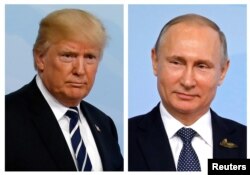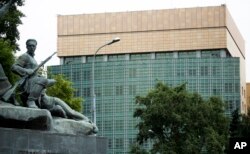U.S. Vice President Mike Pence says diplomatic actions taken by Russian in response to fresh sanctions will not deter U.S. commitment to its security and that of its allies.
Speaking Tuesday during a visit to Georgia, Pence said the sanctions bill President Donald Trump will soon sign sends a "very clear message" that with Russia's activities in Ukraine and its support for Iran and Syria, its "posture has to change."
Congress overwhelmingly passed the sanctions bill punishing Russia for interference in the 2016 U.S. election, while also imposing new measures on Iran and North Korea. Russia responded by ordering the U.S. to cut its overall staff of more than 1,200 in Russia by 755 people.
"The president and our Congress are unified in our message to Russia: a better relationship, the lifting of sanctions, will require Russia to reverse the actions that required sanctions to be imposed in the first place," Pence said.
Pence is on a multi-nation tour meant to show U.S. support for its allies in the region.
He said after a meeting with Georgian Prime Minister Giorgi Kvirikashvili in Tbilisi that the United States will work with Georgia to counter Russian aggression and "seek a peaceful resolution" that restores the country's internationally recognized borders.
In 2008, Russia intervened militarily in Georgia, and later recognized the breakaway republics of South Ossetia and Abkhazia as independent states. A few other countries also recognize that independence, though the vast majority of nations consider the areas still as part of Georgia.
"The United States supports Georgia’s sovereignty and territorial integrity within its internationally recognized borders, and under President Donald Trump the United States of America will reject any claim at any time by any nation that undermines this enduring principle," Pence said.
The vice president is also traveling Tuesday to Montenegro, NATO's newest member.
No response yet to Putin
Russia's retaliation for the U.S. sanctions is believed to be the single largest cut ever imposed on the U.S. embassy in Moscow and consulates elsewhere in Russia, although many of those to be dismissed are likely Russians working in support positions.
Russian President Vladimir Putin said the cuts would leave both Russia and the U.S. with the same number of staff and diplomats in Washington and Moscow, respectively - 455.
President Donald Trump has been silent on the issue since Putin announced his action. Asked about this Monday, White House Press Secretary Sarah Huckabee Sanders said, "Right now we are reviewing our options, and when we have something to say on it we will let you know."
The U.S. State Department said the order to reduce the number of American diplomats in Russia was "a regrettable and uncalled for act." A spokesman said U.S. officials are assessing how to respond to Putin.
A Russian analyst, Nikolai Petrov of the Higher School of Economics in Moscow, said the move reflects the Kremlin's disillusionment with President Trump: "These measures are tough, and it is linked to a deep disappointment that came after the euphoria linked to the arrival of Donald Trump [to power], and to the idea that today we will start our relations anew."
Another Russian analyst, Gleb Pavlovsky, said a return to Cold War-era hostilities with the U.S. will only boost Putin’s popularity at home ahead of another likely bid for the Russian presidency next year.
Pavlovsky, a former political consultant for the Kremlin who is now president of the Foundation for Effective Politics in Moscow, explained how U.S. efforts to "punish" Putin may have the opposite effect: "American sanctions naturally are causing a definite mass reaction [in Russia] - an anti-American, pro-Putin reaction." If Putin wished, Pavlovsky added, he could make the American sanctions the centerpiece of his re-election campaign next year.
Russians will feel cutback
Other experts say the vital work of the U.S. embassy in Moscow will continue despite the massive cuts. Steven Pifer, a former U.S. diplomat now with the Brookings Institution, told VOA that Russians also may discover some unintended consequences of their president's crackdown on U.S. diplomacy.
"My assumption is hundreds of Russians are going to lose their jobs now," Pifer said. "And when you’re looking at priority functions of the embassy, you know, visa functions are important but they’re not as important as other functions. So my guess is that those Russians [who] want to travel to the United States are going to find that visa processing is going to take longer than usual because of reduced staff in the consular section."
Pifer was assigned to the U.S. embassy in Moscow in 1986, at a time when there were several back-and-forth expulsions between the U.S. and the Soviet Union. He later served on the National Security Council under former President Bill Clinton, and was ambassador to Ukraine from 1998-2000.
During his time in the Russian capital, Pifer said, American staff were called upon for "all-purpose duty" at times when Russian support staff were unavailable for political reasons.
"So, five or six days out of every seven, I would work on my normal portfolio, which is arms control," Pifer recalled. "And then one day, I’d drive a truck. And the embassy got by. There was actually this incredible spirit in the embassy that we were going to show the Soviets that this kind of action was not going to cramp the embassy."
Pifer said he expects the same determined spirit from U.S. embassy personnel now.







